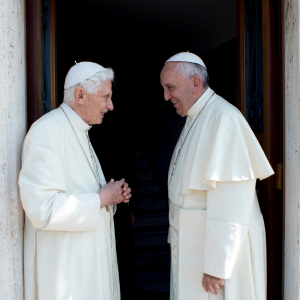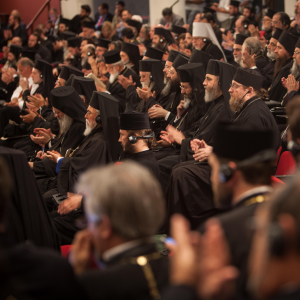This week’s Orthodox Holy and Great Council, the first such summit of primates in over 1,200 years, has an official agenda that excludes many of the major problems facing the Orthodox world today.
The 55-year preparatory phase narrowed down the focus to six mostly internal church issues that left out several of challenges such as the confused state of the churches in Ukraine or the rivalry between the Russians and spiritual leader Ecumenical Patriarch Bartholomew.
In the end, the Russians and the churches of Antioch, Bulgaria and Georgia did not come to the Council in this town in western Crete, with all saying it needed more preparation. One of them, the Damascus-based Church of Antioch also stayed away because of a dispute with the church of Jerusalem over jurisdiction in Qatar.
Carol Saba, Antioch’s spokesman for the Council, told The Tablet this dispute over Qatar may look to outsiders like a local feud, but it reflects a church-wide problem that should have been on the agenda. In fact, he said, the Council should be working through a different agenda altogether.
The different agenda he would have liked is what he calls the “agenda of the Holy Spirit”.
“Inviting the Holy Spirit on our journey means that we as a Church have to read carefully the “signs of the time”, as Pope John XXIII used to say when he spoke of the conciliar process of Vatican II.”
“The agenda of the Holy Spirit is first about how to reconcile eschatology with incarnation,” the Lebanese-born French lawyer said in his office in Paris. Faith is ultimately focused on our final destiny as believers, he explained, but the Church also lives very much in this world.
“Sometimes the Orthodox churches just take account of the eschatology,” he said. “It cannot only think of the eschatology, leaving the world to go to ruin.”
The second issue is how to reconcile Church tradition with modernity. Saba said this was a question that came up in many debates about renewing the Church. ”Modernity is not modernism. Modernity means understanding in depth today’s world and its major challenges and act prospectively in consequence,” he said.
“This is what Pope Francis is battling with in the Catholic Church, which is also torn between reformists and conservatives, between the managers and the missionaries and in reconciling tradition with modernity. “
“To a certain extent, the Church forgot what mission means. It means to bring the truth of Christ to those who don’t know it yet. You do this not in your own words, but in the words of those who are outside of the Church’s scope. When St Paul went to Athens, he spoke to them in their words, not like a Jewish theologian.”
The third issue is the governance of the Orthodox Church, Saba said, noting that the motto of the Council is “He called all to unity”. The fact that only 10 churches are meeting in Crete indicates a serious problem.
Saba saw two ways of understanding unity. The first is the “competition model”, where all 14 churches live in parallel and some end up competing with others. The second would be a “complimentary model”, where they hark back to St Paul’s image of one body with different members.
“The competition model is harming the Orthodox Church and slowly destroying its unity. All the churches have, to varying degrees, considered themselves as the whole body, not as a member of the body. With this crisis, they have hopefully started to understand this, but still they don’t have a tool to regulate the crisis. The Council revealed this problem.”
Saba proposed the Orthodox should take a lesson from world political leaders who formed what became the G8 group of nations that meet yearly to discuss global issues and what they can do about them. They saw the United Nations could not deal effectively with important world crises and resolved to meet regularly to discuss what they could do about them.
“The same thing applies to the Orthodox world: “When the 14 churches want to decide something together, they set up lengthy processes that take more than 50 years. And then 10 days before the Council, everything blows up.”
His suggestion is to turn the synaxis, a meeting of primates occasionally called to discuss a specific problem, into a regular institution.
“This should not be a super-synod, replacing or working above the Churches own Holy Synods,” he explained. “It should work like the G8. We don’t do that now.”
At a time of instant communications and the expansion of the faith through migration to many parts of what the Orthodox consider their diaspora, the need for this is all the more pressing.
“In the Catholic Church, Pope Francis is challenging the world and the Orthodox churches by showing them the benefits of unity in a globalised world,” Saba said. “As a pope coming from the periphery and not from the Center, he understood the new paradigm of today’s world of networks. The Orthodox Church should have been well prepared to understand this network paradigm.”
The Orthodox, who separated from Rome in 1054 over the issue of papal authority, reject the idea of having one strong leader. But Saba thinks they can have stronger leadership if they update the collegial Orthodox model with better decision making.
“There are two models for a church – the Catholic and the Orthodox. Both have pros and cons,” he said. “Pope Francis sees this. The Synod on the Family was organised on the basis of conciliarity. It’s an Orthodox model.
“But this model needs to add a decision-making process. If you have conciliarity without a decision-making model, you have what is now happening in Crete.”
Photo courtesy of Sean Hawkey




 Loading ...
Loading ...